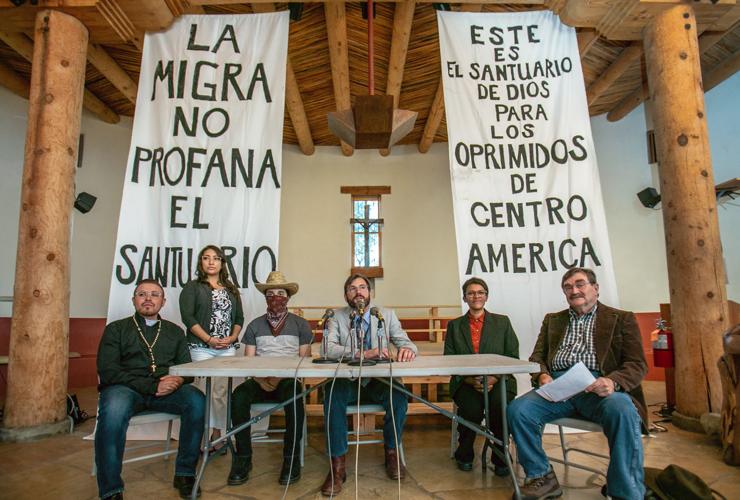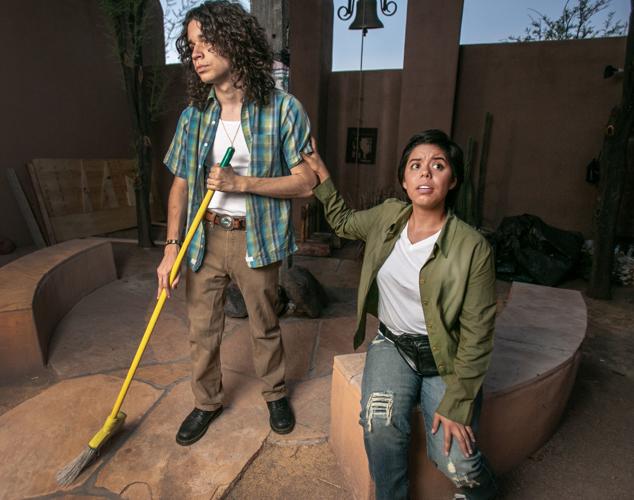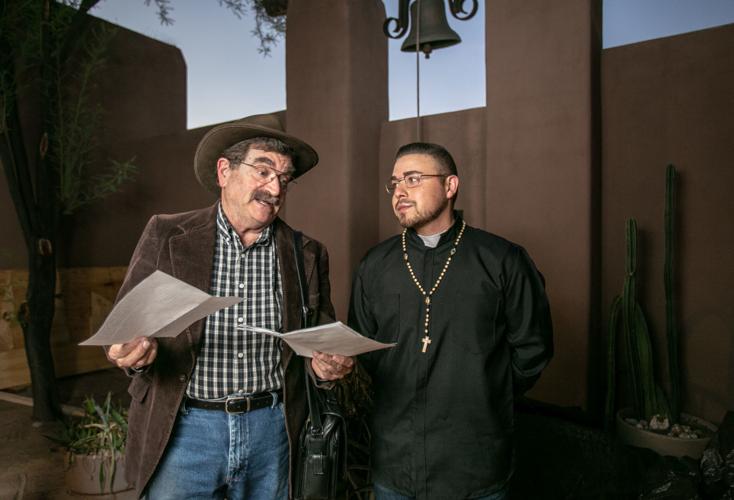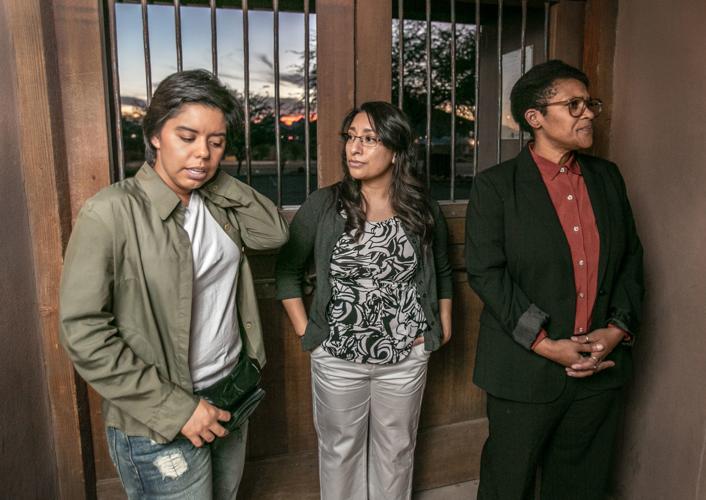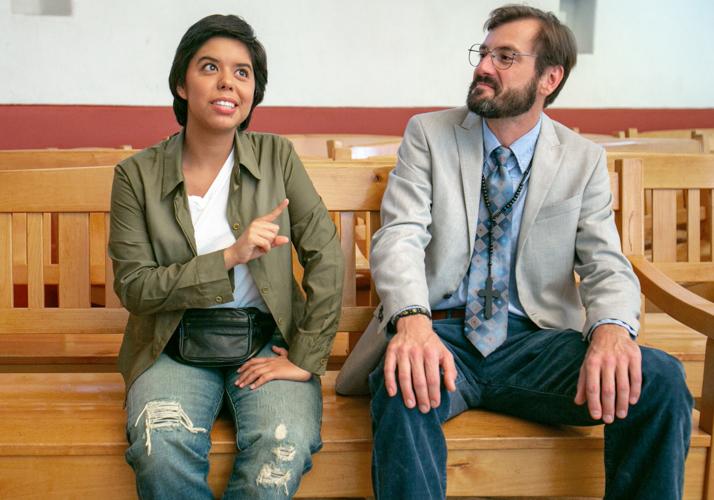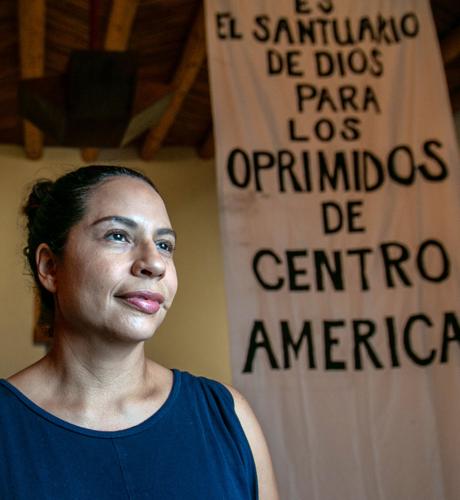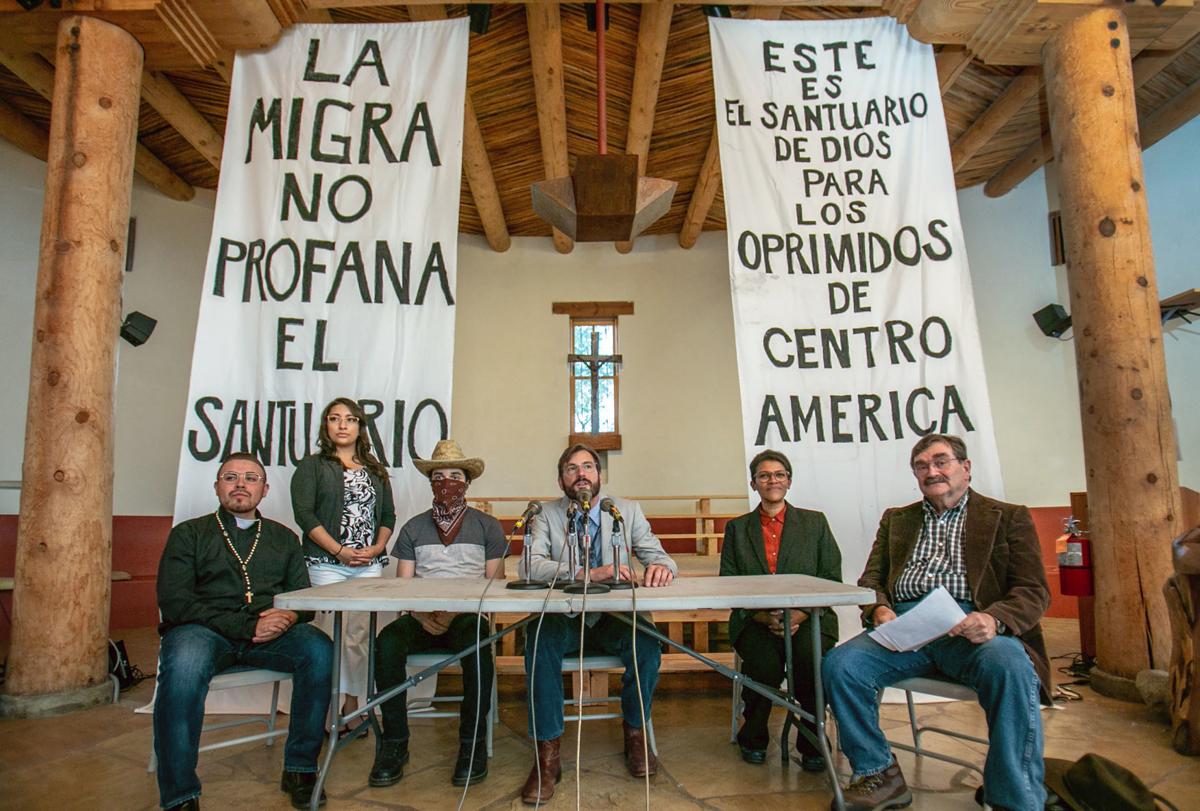They came by the thousands in the early 1980s, seeking asylum from U.S.-backed governments that tortured and murdered those who opposed it.
Those refugees from Central America — most of whom were not granted the asylum that U.S. law allowed for — inspired a group of Tucsonans to launch the sanctuary movement to help those fleeing terror.
And it is that movement that has inspired Milta Ortiz’s new play, “Sanctuary,” which Borderlands Theater premieres this weekend.
It will be staged at Southside Presbyterian Church, which, in 1982, became the first church in the country to declare itself a sanctuary to protect refugees. But it was not the last — by 1985, 500 churches around the country followed Southside’s example.
The play is the first in a trilogy Ortiz is writing about the movement. “Sanctuary” covers the very beginnings, when founders realized the need and weighed it against the consequences of civil disobedience.
Ortiz’s parents fled El Salvador in 1980, lucky enough to be among the few that were given legal status. Seven months later, Ortiz, who was close to 8, and her sister joined her parents.
But it wasn’t until she came to Tucson that she learned of the sanctuary movement. She was researching “MAS,” her 2016 play about TUSD’s banned Mexican American Studies program, when she met one of the movement’s co-founders, Lupe Castillo.
“She said, ‘you’re Salvadoran, aren’t you,’” Ortiz recalls. Castillo thought she might be interested in learning about the movement.

Borderlands Theater’s “Sanctuary” was staged at Southside Presbyterian Church, where the Sanctuary Movement was launched in 1982. Pictured are David Grijalva and Leticia Gonzalez.
“Ever since then, it’s been marinating in my mind that this is a play.”
It was more than an urge to write. It was the need to acknowledge the bravery of people who risked going to prison to help strangers.
“I feel obligated to share it,” she says about the sanctuary movement’s story.
“My family came over because of the war, but it was only because my grandmother worked for wealthy people (that we were allowed to come legally). I’ve always felt less than because Salvador is rarely mentioned in a good light. It meant something to me ... that Americans were willing to put themselves at risk to help Salvadorans.”
She holds those Americans in an elevated light.
“It was a pretty amazing thing they did,” she says. “I wonder if I would be willing to do that — risk jail for people I don’t know.”
Ortiz intended to do just one play about the movement, but ...
“Once I got knee-deep in research, I realized it was a trilogy,” she said.
Ortiz studied the original movement and spoke to many of the co-founders and others involved in it. And while her characters are based on real people, the names have been changed, and she has used literary license to tell the story.

Michael F. Woodson and Eddie Diaz rehearse a scene from the Borderlands Theater production of “Sanctuary.” While the characters in the play are based on real people, their names have been changed. Many of the sanctuary movement’s originators will take part in a panel discussion after the Sunday afternoon performance on Sept. 9.
This summer, as she was finessing the script, the separation of children from refugee parents set the news on fire.
“I didn’t realize how timely it would end up being,” Ortiz says of the play. “The immigration issue has gotten worse. Today, with the children in cages, we can see how it’s gotten worse. That hadn’t started when I was first writing.”
The Rev. John Fife, a co-founder of the sanctuary movement, agrees that the timing is right for the play.
“What the sanctuary movement involved, its strategy and that whole 10-year history (in the ’80s) has become relevant again in the last four or five years nationwide,” he says. “The idea of sanctuary as resistance to government violations of refugee laws and human rights has become extraordinarily relevant.”
Margo Cowan, another co-founder of the movement, has attended a reading of the play. A lawyer, she still works with refugees and sees the need to remember and take action.
“It’s really a very important work, to look through that lens again and examine civil initiatives,” she says. “That’s what we do in a democracy when government acts in ways that are inconsistent with our values. That’s an important story to tell.”
“It’s such a story of human beings helping each other, of compassion and love,” says Marc Pinate, the director of the play.
“We didn’t time it to happen the summer after caging children, but now we feel it is such a necessary story. It reminds us that there were people in the past who were willing to take a stand to stop dehumanization. Dehumanization is being used so much right now, and it is so perilous to everything our country stands for.”

Playwright Milta Ortiz, author of Sanctuary, the first play of a trilogy that tells of the formation of the sanctuary movement in Tucson at Southside Presbyterian Church on August 27, 2018, in Tucson, AZ.

Leticia Gonzalez as Nidia Morazan, Marisa Acosta as Mica Ochoa and T Loving as Carol Moyer rehearse a scene from the play “Sanctuary,” on August 27, 2018, at Southside Presbyterian Church in Tucson, AZ. It is the first of a trilogy by Milta Ortiz that tells of the formation of the sanctuary movement in Tucson.

Leticia Gonzalez as Nidia Morazan and Eric Everts as Jeff Chord rehearse a scene from the Borderlands Theater production of “Sanctuary,” on August 27, 2018, at Southside Presbyterian Church in Tucson. It is the first of a trilogy by Milta Ortiz that tells of the formation of the sanctuary movement in Tucson.
Photos: The Sanctuary Movement in 1984
"Road to Refuge" special report in 1984
Updated
"Juana", Jim Corbett, "Jorge" and "Carlota" ,(l-r) travel in a car driven by Sanctuary volunteers from Hermosillo to Nogales, Sonora where they will saty in a safehouse and wait to cross the border into the U. S. Photo from the 1984 series "Road to Refuge" documenting the travels of Guatemalan refugees from Mexico city to Tucson by means of an "underground railroad".
"Road to Refuge" special report in 1984
Updated
During the hike following her border crossing "Juana" stops to empty rocks from her shoe during her hike across the thick vegetation and rough terrain near the Mexico/US border. Photo from the 1984 series "Road to Refuge" documenting the travels of Guatemalan refugees from Mexico city to Tucson by means of an "underground railroad".
"Road to Refuge" special report in 1984
Updated
During the hike following her border crossing "Juana" hustles through the thick vegetation and rough terrain near the Mexico/US border. Photo from the 1984 series "Road to Refuge" documenting the travels of Guatemalan refugees from Mexico city to Tucson by means of an "underground railroad".
"Road to Refuge" special report in 1984
Updated
"Juana" climbs the desert border fence from Sonora, Mexico in to Arizona with the help of Jim Corbett, a member of the Sanctuary Movement during the summer of 1984. Photo from the 1984 series "Road to Refuge" documenting the travels of Guatemalan refugees from Mexico city to Tucson by means of an "underground railroad".
"Road to Refuge" special report in 1984
Updated
Guatemalan refugee "Juana", trying to remain inconspicuous, reads a newspaper in the Mexico City Airport during her travel to America in the summer of 1984. Photo from the 1984 series "Road to Refuge" documenting the travels of Guatemalan refugees from Mexico city to Tucson by means of an "underground railroad".
"Road to Refuge" special report in 1984
Updated
"Juana" catches a nap during the first airplane flight of her life from Mexico City to Hermosillo, Sonora in the summer of 1984. Photo from the 1984 series "Road to Refuge" documenting the travels of Guatemalan refugees from Mexico city to Tucson by means of an "underground railroad".
"Road to Refuge" special report in 1984
Updated
Guatemalan refugee "Juana" follows Jim Corbett up the last leg of her journey through the desert towards her freedom. They would be met members of the Sanctuary movement and driven to Tucson. Photo from the 1984 series "Road to Refuge" documenting the travels of Guatemalan refugees from Mexico city to Tucson by means of an "underground railroad".
"Road to Refuge" special report in 1984
Updated
Guatemalan refugee "Juana" lies low in the back of a camper, keeping out of sight oif passersby, outside Bisbee, Arizona. Juana had just crossed the border fence where she hiked through the desert and was picked up by members of the sanctuary movement and driven to Tucson. Photo from the 1984 series "Road to Refuge" documenting the travels of Guatemalan refugees from Mexico city to Tucson by means of an "underground railroad".
"Road to Refuge" special report in 1984
Updated
Sanctuary founder and guide Jim Corbett, left, holds a midnight meeting with "Jorge" and "Carlota" in Mexico City to discuss travel plans for their journey to America. Photo from the 1984 series "Road to Refuge" documenting the travels of Guatemalan refugees from Mexico city to Tucson by means of an "underground railroad".
"Road to Refuge" special report in 1984
Updated
"Juana" mops the floors at a Nogales, Mexico safehouse during an eight day wait to cross into America with the help of members of the Sanctuary Movement.. Photo from the 1984 series "Road to Refuge" documenting the travels of Guatemalan refugees from Mexico city to Tucson by means of an "underground railroad".
"Road to Refuge" special report in 1984
Updated
"Juana" stops to rest during her hike across the thick vegetation and rough terrain near the Mexico/US border. Photo from the 1984 series "Road to Refuge" documenting the travels of Guatemalan refugees from Mexico city to Tucson by means of an "underground railroad".
"Road to Refuge" special report in 1984
Updated
"Juana" sits in a safehouse in Nogales, Mexico waiting to cross the desert border fence into Arizona with the help of members of the Sanctuary Movement.. Photo from the 1984 series "Road to Refuge" documenting the travels of Guatemalan refugees from Mexico city to Tucson by means of an "underground railroad".
"Road to Refuge" special report in 1984
Updated
"Juana" tries on a hat at a Nogales, Mexico safehouse during an eight day wait to cross into America with the help of members of the Sanctuary Movement.. Photo from the 1984 series "Road to Refuge" documenting the travels of Guatemalan refugees from Mexico city to Tucson by means of an "underground railroad".
"Road to Refuge" special report in 1984
Updated
Sanctuary founder and guide Jim Corbett stops for a rest during his desert crossing hike. Photo from the 1984 series "Road to Refuge" documenting the travels of Guatemalan refugees from Mexico city to Tucson by means of an "underground railroad".
"Road to Refuge" special report in 1984
Updated
"Jorge" and "Carlota" wait in a Nogales, Arizona church to continue their journey to Tucson. Photo from the 1984 series "Road to Refuge" documenting the travels of Guatemalan refugees from Mexico city to Tucson by means of an "underground railroad".
"Road to Refuge" special report in 1984
Updated
Sanctuary founder and guide Jim Corbett, right, meets Guatemalan refugee "Juana" in a Mexico City hotel room to discuss travel plans for their journey to the United States. Photo from the 1984 series "Road to Refuge" documenting the travels of Guatemalan refugees from Mexico city to Tucson by means of an "underground railroad".
"Road to Refuge" special report in 1984
Updated
"Juana" stands in front of Southside Presbyterian Church in Tucson where she was given safe haven by the Sanctuary Movement.
"Road to Refuge" special report in 1984
Updated
"Juana" hurries along an Hermosillo street to meet a volunteer who will drive her north to a border safehouse. Photo from the 1984 series "Road to Refuge" documenting the travels of Guatemalan refugees from Mexico city to Tucson by means of an "underground railroad".
"Road to Refuge" special report in 1984
Updated
"Jorge" reads in his "room" at a Nogales, Mexico safehouse during an eight day wait to cross into America with the help of members of the Sanctuary Movement.. Photo from the 1984 series "Road to Refuge" documenting the travels of Guatemalan refugees from Mexico city to Tucson by means of an "underground railroad".
"Road to Refuge" special report in 1984
Updated
Waiting at a safehouse to be taken to the U.S. "Juana" recounts her story of rape and torture at the hands of Mexican guards. Photo from the 1984 series "Road to Refuge" documenting the travels of Guatemalan refugees from Mexico city to Tucson by means of an "underground railroad".
"Road to Refuge" special report in 1984
Updated
"Jorge" watches television at a Nogales, Mexico safehouse during the wait to cross into America with the help of members of the Sanctuary Movement.. Photo from the 1984 series "Road to Refuge" documenting the travels of Guatemalan refugees from Mexico city to Tucson by means of an "underground railroad".
"Road to Refuge" special report in 1984
Updated
"Juana" is greeted by a volunteer at Southside Presbyterian Church following her crossing into America with the help of members of the Sanctuary Movement. Photo from the 1984 series "Road to Refuge" documenting the travels of Guatemalan refugees from Mexico city to Tucson by means of an "underground railroad".
"Road to Refuge" special report in 1984
Updated
"Carlota" holds an id card she used to cross the border in Nogales, Mexico. Photo from the 1984 series "Road to Refuge" documenting the travels of Guatemalan refugees from Mexico city to Tucson by means of an "underground railroad".
"Road to Refuge" special report in 1984
Updated
Rev. John Fife of the Southside Presbyterian Church. He is one of the founders of the Sanctuary movement.
"Road to Refuge" special report in 1984
Updated
Jorge and Carlota, having crossed the border with fake identification cards are greeted by family members upon their safe arrival in Tucson. Photo from the 1984 series "Road to Refuge" documenting the travels of Guatemalan refugees from Mexico city to Tucson by means of an "underground railroad".


